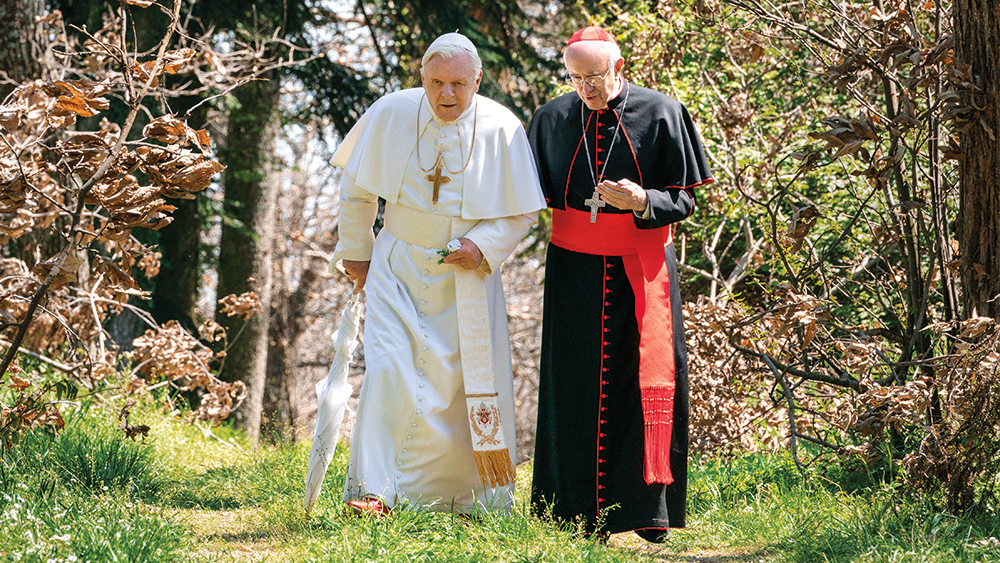‘Two Popes’ Writer Calls Dialogue ‘the Best Special Effect in Movies’
By Tim Gray
LOS ANGELES (Variety.com) – In 1964, Variety reviewer Robert J. Landry was over the moon about the Paramount movie “Becket,” which Edward Anhalt scripted from Jean Anouilh’s play. Landry said the film was “invigorated by story substance, personality clash, bright dialogue and religious interest. Patrons and perhaps reviewers will tend to heap credit on the actors. They deserve it … but the film proves again that a great film is the harmoniously combined amalgam of many professional talents.” The result, he said, is “an intellectual as well as an emotional experience.”
He was talking about the Peter Glenville-directed movie, but those exact words also describe Netflix’s “The Two Popes.” The film scored three Oscar noms, for lead actor Jonathan Pryce, supporting for Anthony Hopkins and the script by Anthony McCarten (his fourth Oscar nomination in six years).
In conversation, McCarten cites “Becket” as one of the films that impressed him when he was young, along with others such as “A Man for All Seasons” and “Lawrence of Arabia.”
McCarten later learned to appreciate the works of Mike Leigh, such as “Secrets and Lies,” and David Mamet (he adds, “‘Glengarry Glen Ross’ is Mamet at his finest”). “Coming from theater, I respond to dialogue, which flies in the face of the movie convention, ‘show, don’t tell.’ But actually, I like, ‘tell, don’t show.’ I find dialogue the best special effect in movies.”
In the 21st century, it’s easier to market action-packed, VFX-heavy movies. But dialogue-heavy films add a touch of class to Hollywood and it’s significant that so many films that we consider all-time greats are so esteemed because they have memorable dialogue. That list includes pretty much everything written by Billy Wilder, Joseph L. Mankiewicz, Paddy Chayefsky, Mae West, Preston Sturges and William Goldman.
Some films have memorable lines: “I’m the king of the world!” “May the Force be with you,” “Say hello to my little friend” and, of course, “Plastics.” But there are other movies that have so much quotable dialogue that it’s hard to single out any one line. That list includes “The Wizard of Oz,” “Casablanca,” “Sunset Boulevard,” “All About Eve” and “The Godfather.”
McCarten is also carrying out the tradition of Films of Ideas. It’s something carried over from the stage, going back to Greek tragedies and Shakespeare, but also George Bernard Shaw, Henrik Ibsen, Lorraine Hansberry, Alan Bennett and August Wilson. They wrote plays designed to get the audience talking — and listening.
Bennett and Wilson were Oscar-nominated for adaptations of their plays and Shaw actually won, for his script of the 1938 “Pygmalion.”
McCarten acknowledges that some of his favorite movies are “very wordy,” but they can also be “inspirational.” Though none of his favorite films is a direct antecedent to the new film, he adds that, if anything, “Two Popes” is “a continuation of ‘Darkest Hour,’ when I was looking at the power of language to change minds and asking, ‘Can words change history?’ In ‘Darkest Hour,’ they did.
“In ‘Two Popes,’ I’m looking at the limits of debate, whether we can hope to change someone else’s mind through an argument. It’s about two men who learn to listen — and I hope that the film is saying that until we learn to listen, we will remain adversarial.”
The old Hollywood bromide goes, “If you want to send a message, call Western Union.” But the message of “” arrives at a time when the public — and our world leaders — need to hear it: Just listen to other people, and think about what they said.

